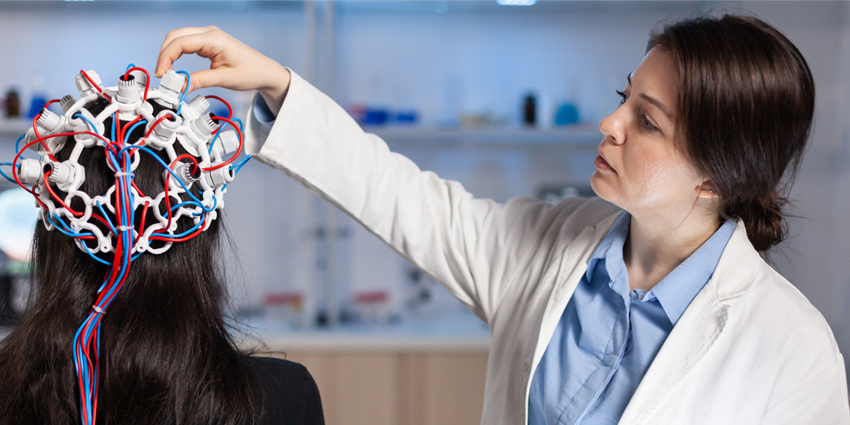Imagine releasing the mind’s potential through EEG therapy, a domain where brainwaves pave the path to healing and understanding.
As you explore the intricacies of this innovative treatment, you’ll uncover the fascinating ways in which EEG technology holds promise for addressing various neurological and mental health challenges.
The insights gained from EEG therapy’s capabilities could revolutionize the landscape of healthcare, offering new avenues for enhancing well-being and cognitive function.
Understanding EEG Therapy Mechanisms
To understand EEG therapy mechanisms, focus on the brain’s electrical activity and how it’s influenced by external stimuli. EEG therapy works by measuring the electrical activity in your brain using electrodes placed on your scalp. These electrodes detect brain waves, which represent the communication between neurons.
When undergoing EEG therapy, the brain’s electrical patterns are analyzed to determine any irregularities or areas that need attention. By understanding these patterns, therapists can tailor interventions to help regulate and optimize brain function. Through this process, EEG therapy aims to improve cognitive functions, enhance focus, and address issues like anxiety or ADHD.
Ultimately, by targeting specific brainwave patterns, EEG therapy offers a non-invasive way to support mental well-being and cognitive performance.
Applications in Neurological Disorders
Exploring the potential applications of EEG therapy in neurological disorders involves harnessing the brain’s electrical activity to address specific cognitive challenges and enhance mental well-being. EEG therapy has shown promise in various neurological conditions, offering a non-invasive and personalized approach to treatment.
Some key applications include:
– Monitoring brain activity in epilepsy patients to predict and prevent seizures.
– Evaluating attention and cognitive function in individuals with ADHD.
– Providing neurofeedback training for patients with traumatic brain injuries to improve cognitive function.
– Diagnosing and monitoring progression in neurodegenerative disorders like Alzheimer’s disease.
– Guiding treatment strategies for stroke rehabilitation based on real-time brain activity feedback.
Potential for Mental Health Conditions
In mental health conditions, EEG therapy shows promising potential for improving cognitive function and emotional well-being.
By monitoring brain activity, EEG therapy can help individuals better understand their thoughts and emotions, leading to enhanced self-awareness and the development of coping strategies.
It has been found to be particularly beneficial for conditions like anxiety, depression, and PTSD, offering a non-invasive way to target specific areas of the brain associated with these disorders.
EEG therapy can also assist in identifying patterns of brain activity related to symptoms, aiding in personalized treatment plans.
Future Implications and Research Opportunities
Future research in EEG therapy’s applications holds significant potential for expanding treatment options and enhancing therapeutic outcomes. As advancements continue in this field, here are some exciting future implications and research opportunities to ponder:
– Exploring the use of EEG therapy in combination with other therapeutic modalities for enhanced efficacy.
– Investigating the long-term effects of EEG therapy on various mental health conditions.
– Developing personalized EEG treatment protocols tailored to individual patient needs.
– Examining the potential of EEG therapy in treating neurological disorders beyond mental health.
– Conducting large-scale clinical trials to further validate the effectiveness of EEG therapy across different populations and conditions.
Get more information at https://www.johnsonmedicalassociates.com/neurofeedback-biofeedback/ today.


